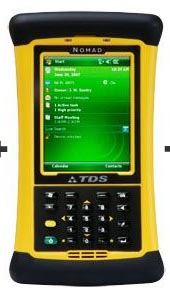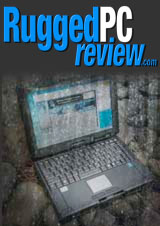|
Trimble Nomad 800
Marvell PXA320-powered next gen rugged handheld
(by Conrad H. Blickenstorfer)
 First things first: in case you are confused about the difference between the Trimble Nomad and the Tripod Data Systems, or TDS, Nomad, don't. TDS has been a subsidiary of Trimble since 2000. TDS totally concentrates on the rugged handheld computing market with its Recon and Ranger handhelds configured to handle any number of survey and other vertical market applications. Trimble has traditionally covered pretty much all aspects of GPS and GIS systems, and so there is a lot of synergy. However, several hardware platforms are offered both under the TDS and the Trimble brand; they just may be customized and equipped differently for different applications.
First things first: in case you are confused about the difference between the Trimble Nomad and the Tripod Data Systems, or TDS, Nomad, don't. TDS has been a subsidiary of Trimble since 2000. TDS totally concentrates on the rugged handheld computing market with its Recon and Ranger handhelds configured to handle any number of survey and other vertical market applications. Trimble has traditionally covered pretty much all aspects of GPS and GIS systems, and so there is a lot of synergy. However, several hardware platforms are offered both under the TDS and the Trimble brand; they just may be customized and equipped differently for different applications.
That said, the new Trimble/TDS Nomad 800 Series is a remarkable product in many ways.
First of all, it may well be the first rugged handheld to use Marvell's awesome 806MHz next generation PXA320 processor. Marvell, of course, bought Intel's XScale application processor business in 2006, and so all fomer Intel PXA chips are now Marvell chips. The speedy new PXA320, the flagship of the PXA3xx series codenamed "Monahan," is able to scale from 806MHz to 624MHz to conserve power when full performance isn't needed. The chip is also more energy-eficient than the predecessor Bulverde processor, especially under heavy video and audio load. The PXA320 can run VGA resolution video at 30 frames per second, support a 5megapixel digital camera, video telephony, all at lower power consumption than the older XScale chips. So Trimble/TDS chose wisely. Add to that a nice 128MB of RAM, a gigabyte of Flash, Bluetooth 2.0, 801.11b/g WiFi, USB host and client ports and a full 480 x 640 VGA display and you have an impressive offering indeed.
But that is not all. The Nomad's creators designed the machine to be as flexible as possible, and that is accomplished via special caps and extended caps that can accommodate a variety of options. The Nomad can be ordered with an integrated 1D bar code laser scanner, an integrated 2-megapixel digital camera, GPS, and a variety of different keypad options. All in all, there are four different models.
Second, the Nomad's interactive product launch was just too cool. The company had created a special Web 2.0-style outdoorrugged.com website, withg video, community building, blogs and all. So instead of a stuffy product announcement somewhere or a press release, those interested, and there were quite a few, could participate in the actual July 17, 2007 unveiling of the Nomad online. The Nomad's creators explained their goals, the process, how they tested everything and then tested it again, how they earned the "Designed for Windows Mobile" sticker, how they employed the HALT (Highly Accelerated Life Test) procedures, and how they road-tested the Nomad by strapping in onto motorcycles for a 2,800 mile road test. All the stuff you can usually read in brochures came to life that way. How did they seal all those potential leaks points? Like the LCD, boots, the speaker, the microphone? The answers were right there. Very clever, and the folks at Sanda Communications who put it all together deserve a giant 2.0 pat on the back!
But more on the Nomad: this is one tough machine. There aren't many IP67-capable handhelds. Yes, it survives underwater for half an hour (as a Scuba diver I may just put that to the test). Surviving 26 4-foot drops with state-of-the-art electronics and a VGA display is not easy. And being able to run the Nomad in a temperature range of -22 to 140 degree Fahrenheit, well, that covers just about anyplace.
Look for a full review of the Trimble/TDS Nomad here at RuggedPCReview.com real soon!
|



